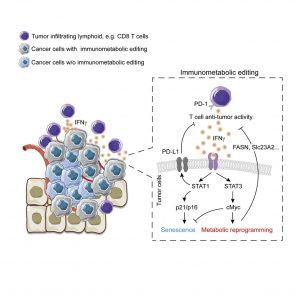In a recent publication, Researcher have found a new role of IFN- γ in supporting Tumor cells to form a Suppressive Tumor Microenvironment (TME) via STAT3 (Figure 1).
Cancer is a major health concern that is becoming more common with the passage of time. The failure of the immune system to prevent cancer progression has always sparked curiosity. Nowadays, the change in metabolic signature of cancerous cells in response to immune response is emerging as one of reason for Immune evasion. Traditionally, Oncogenic mutations and hypoxia are believed to be major drivers for metabolic reprogramming in tumors. Metabolic crosstalk and tug-of-war between tumor cells and tumor infiltrating cells (TILs) plays a critical role by promoting T- cell dysfunction and the establishment of TME. The role of these TIL cells in metabolic reprogramming is an unexplored dimension.
Researchers have shown that CD8+ TILs exhibited high capacity to release IFN- γ. They have found out that the exposure of IFN- γ during the early-stage tumorigenesis can lead to metabolic reprogramming by alternatively activating STAT-3. This immunoediting result in epigenetic modification to cause this metabolic alternation. Altogether, their study reveals a new signaling cascade in which IFN- γ and STAT3 is involved in immunoediting via epigenetic modification to stimulate c-Myc mediated metabolic reprogramming to support tumor evasion.
Their finding support to target STAT-3 to increase the efficiency for cancer treatment.
Journal article: Chin-Hsien Tsai, et al. 2023. Immunoediting instructs tumor metabolic reprogramming to support immune evasion. CELL Metabolism.
Summary by Shubham Kumar











